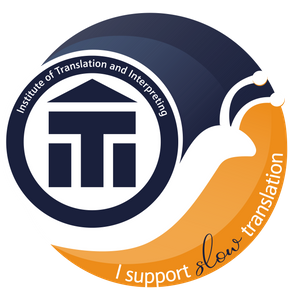Slow translation manifesto
We set out the merits of 'slow translation.'
Artificial intelligence (AI), translation apps and other digital tools can be great when we simply need a quick translation – of a restaurant menu, say, or an informal email – but machine translation without human input can be risky. The Institute of Translation and Interpreting (ITI) sets out the merits of ‘slow translation’ as a more appropriate approach when getting the message right matters.
In an increasingly interconnected world, the need for effective communication and translation between languages has never been greater. Trade, commerce, travel and, indeed, conflict require us to overcome language barriers to help people find solutions to problems and to create opportunities.
There is a growing appetite for more content to be translated into more languages, which has fuelled a rush towards automated translation using machine translation software and AI. And while these technologies have their place, we believe that an overreliance on them comes at the expense of nuance, cultural context, and linguistic richness.
So, inspired by the philosophies of the slow food and slow tourism movements, the Institute of Translation and Interpreting proposes an alternative approach – the idea of ‘slow translation’.
We argue that 'slow translation' is a human process thoughtfully carried out by people who care about words and meaning, and who value the time needed to research and understand the intricacies of the source text before translating it into the target language with precision, skill and artistry.
The slow translation approach is built on the following core principles:
Celebrating linguistic diversity
Languages are not just codes to be deciphered – they embody the rich histories, values, and ways of thinking of their cultures. The diversity of human language should be celebrated and preserved from the dulling effect of overly literal translation.
Prioritising artistry over automation
While machine translation democratises access to translation for everyone, skilled human translators remain irreplaceable. They bring nuanced understanding, creative flair and an innate feel for their working languages, honed through years of experience and specialisation.
Advocating for quality
Rushed translation can lead to errors (which can be costly), unnatural language and the loss of crucial subtext. Slow translation emphasises the value of taking the time to carry out appropriate research and consulting with the client and subject experts. It recognises the need for careful polishing and checking, as well as rigorous quality assurance.
Upholding high ethical standards
Translators do not just replace the words of one language with those of another. They are responsible for accurately conveying the message, capturing the original tone of voice in their translated text, and respecting cultural sensibilities and client confidentiality. Professionalism and professional ethics must always be prioritised above shortcuts.
Demonstrating cross-cultural competence
Skilled translators have an in-depth knowledge of their working languages and cultures and respect the contexts of both source and target languages and cultures. This level of competence deserves to be valued and appropriately remunerated.
Whether you’re navigating an international website, deciphering a technical patent, or relishing a literary masterpiece, the slow translation approach upholds the highest standards of cross-cultural understanding. In doing so, it protects the world's linguistic heritage for future generations.

Join the slow translation movement!
Slow translation prioritises quality, responsibility and accuracy above speed in order to create meaningful communication between people and cultures. If you share our vision, download the manifesto and share it with colleagues and clients. You can also download the Slow translation logo to display on your website, email signature and social media.
